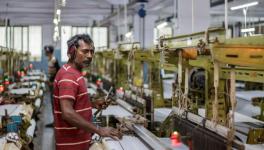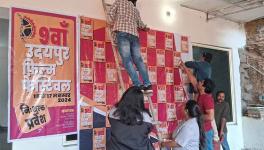Rajasthan Elections: Bhilwara's Textile Industry, Worth Thousands of Crores, is a Living Hell for its Workers
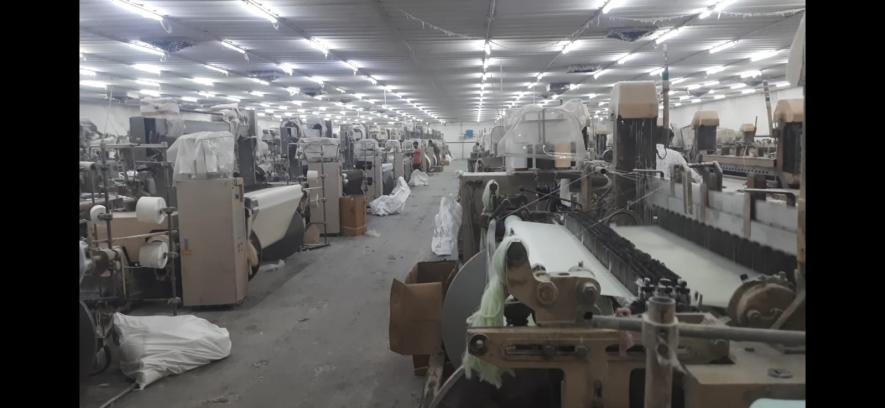
Inside the textile operations that clearly show how there are much more machines than the labour available.
The textile city Bhilwara has a systemic, normalised, oppressive work culture to offer the workers. The scope for jobs keeps decreasing as technology improves, and the standard norm in the city is that the workers must work 12 hours a day.
As the elections come closer, the state has geared up, and all the candidates continue to find ways to lure their voters. In Bhilwara city, the urban poor associated with the city's textile industry failed to find a place in the manifestos of all the candidates.
The sitting MLA from the area is BJP's Vitthal Shankar, and opposing him is the independent candidate Ashok Kothari, a businessman, and as the people call him, 'gau sevak'. As much as religion, caste, and protection of cows have become the heated subject to get votes in the area, the textile workers have no option but to weep in silence.
Kothari, the current favourite of the citizens, owns two factories and has been building a third one. When the reporter asked him about the worker's condition in the area and what the candidate would do if he won the elections, Kothari had no answer.
He said, "We will sit with the workers and understand their problems."
While the candidate made a casual promise, he has been in the industry for decades, and there is not a slight chance that he's unaware of what has been happening with them. Even his poll promise pamphlet has no place for his workers who mint him the money.
Bablu Singh (35), from Madhya Pradesh, migrated to the city in search of a job around 10 years back. He had been working at the same company named Bajaj Enterprises for the longest time until two months back when the company's owner, Navneet Bajaj, allegedly denied him a raise in his salary. Bablu Singh is a senior operator and has around 16 workers under him. The workers get paid Rs 470 a day, and the only demand was to make it Rs 500, seeing the market inflation.
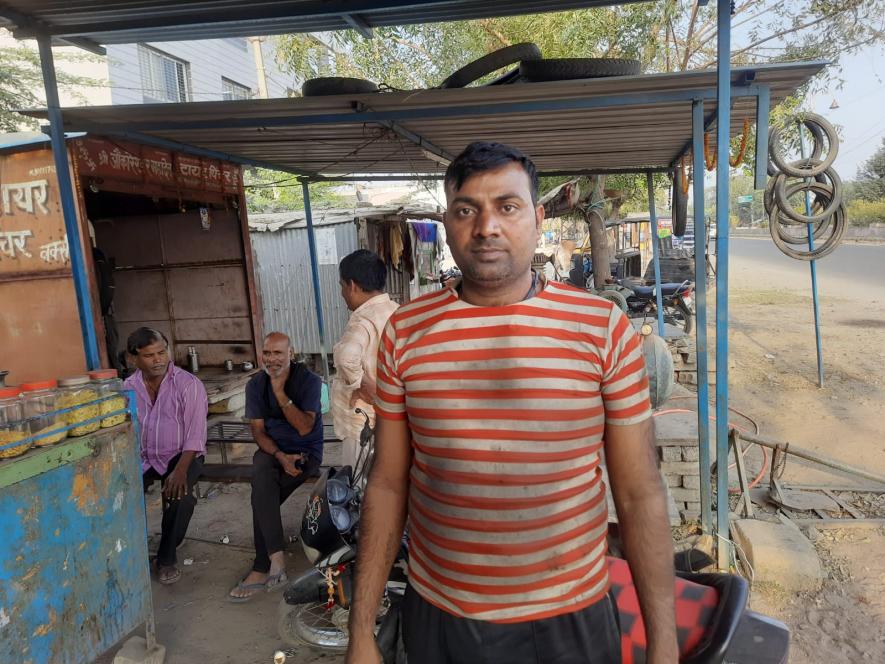
Bablu Singh has been harassed, threatened and kicked out of his previous job.
"He kept compelling me to get the workers back who had denied seeing the behaviour meted out to them. When I did not comply, he asked me to leave the company. I agreed and just asked for my bonuses and the outstanding salary. He did not just not give me the money, but instead asked me to pay him Rs 5,00,000 if I left the job without getting the workers," narrated Singh.
The case was when Singh had joined the company; he had taken an advance from the owner, and the repayment was to be done in terms of monthly deductions from his salary. Now, the outstanding amount was around Rs 60,000. But instead, the owner asked him to pay the whole amount again. The man kept pleading but was thrown out of the factory. In one of his weakest points, the 35-year-old decided to seek justice and approached the labour court, but this did not change things for him. To an extent, the owner kept submitting a cheque under Bablu Singh's account details for Rs 1,60,000. This has bounced twice as the worker does not have the money.
The textile industry of Bhilwara has produced crorepati owners and nightmares for workers. There are over 75,000 workers across the looms, and the total yearly export share of the industry is Rs 1,300 crore. The area has over 400 manufacturing units. Bhilwara district alone generates the state's 44% yarn production capacity.
Singh's case and the treatment he received saw no end. When he tried seeking a job in another company, the vicious owner allegedly sabotaged his reputation in the company, and for a while, he could not have an offer.
"He even threatened me to return the money I never took, and if I did not adhere, he would kill my family."
NewsClick met with Sonu, who is considered to be a 'pehelwan' who works for these big industry stakeholders, and any labourer who tries revolting receives threats first and beating next.
"Our job is simple. If any labourer complains or says he would not bear with what's being given, we first get him into a room and threaten him to back off. If they still deny, we go to their house and beat them up until they give in."
As far as the work routine is concerned, the textile hub, for the longest time, has been making its workers work for 12 hours a day and paying them pennies in return. The first chain of checks on oppression is weak as well. While the district is designated to have eight labour inspectors, currently, there are only two who fail to keep a constant check on the working conditions.
Many left the industry when they witnessed the seamless oppression for years. Naresh Maratha is one such person.
"I was just tired of facing the same routine with no returns. We were promised but never given bonuses. Our salary would remain stagnant for years, and to get it increased by meagre sums of Rs 20-30 a day, we would have to fight only to know that the factory doors were closed for us from the very next day."
Only if threats and lack of justice were not enough, new technology that helps increase production has manufactured new problems for the workers. Ganesh Gehlot is one of the workers at the loom; he works on the main machines that produce the finest material in the country.
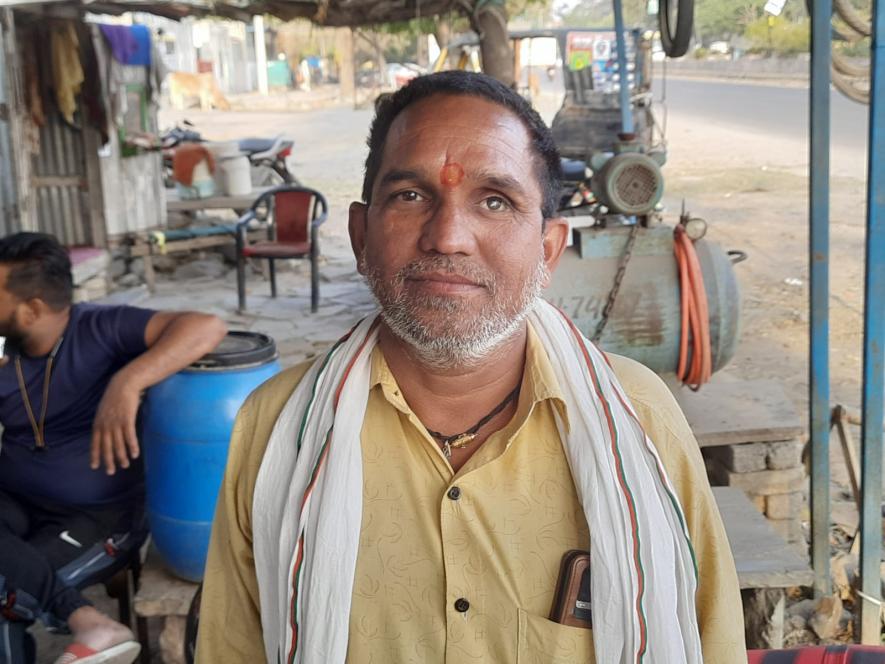
Ganesh lost an eye working at the factory and was given no compensation.
"Earlier, there used to be six labourers if there were six machines. Now, with the latest machines, while there is a lot of work to do, the companies have completely reversed the ratio. For every six machines, there is only one worker. The only thing that remains the same is our salary on an eight-hour basis and the time we are asked to give to the company, 12 hours a day."
There is another machine called the Air Jet, which is used to refine the cotton. In the process, a lot of dust is released, so much so that it chokes up the worker's throat and lungs.
"We do not ask for much, but the least that could be done is we get some jaggery after working at the air jet. Working there even for minutes chokes us up. Many of us have respiratory problems, and our life span is decreasing."
Little heed is paid to the safety of these workers inside the loom. Gehlot lost an eye working there but was given no compensation. Workers at the air jet are not even given masks and work under constant threat.
NewsClick interviewed workers across six factories, and none of the labourers there have been given the mandatory protection of an ESI Card and PF, which would make their lives a bit more secure. At the place where Gehlot works, although there is a deduction of PF, both the employer's and the employee's contribution is taken from the worker's salary.
The city is not fulfilling the basic criteria of working conditions for the work it is famous for. Candidates call the elections a war of dharma, preaching to the citizens that life is about nothing but dharma but turning a deaf ear to the workers. Many of these workers are migrants and end up becoming the bait of cheap labour for these industrialists who make a profit out of their problems.
Get the latest reports & analysis with people's perspective on Protests, movements & deep analytical videos, discussions of the current affairs in your Telegram app. Subscribe to NewsClick's Telegram channel & get Real-Time updates on stories, as they get published on our website.









